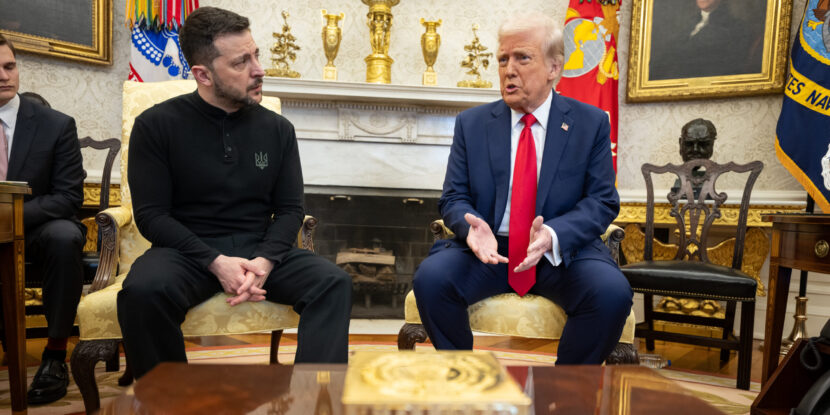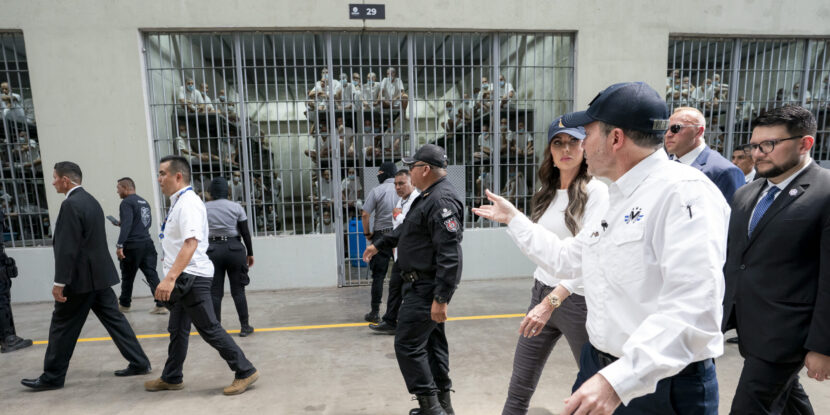
PULSE POINTS:
❓What Happened: President Donald J. Trump has blamed Ukrainian President Volodymyr Zelensky for sabotaging ongoing peace talks with Russia.
👥 Who’s Involved: President Donald J. Trump, President Volodymyr Zelensky, Secretary of State Marco Rubio, Russian President Vladimir Putin.
Your free, daily feed from The National Pulse.
📍 Where & When: President Trump reacted to remarks made by Zelensky on April 23.
💬 Key Quote: “It’s inflammatory statements like Zelenskyy’s that makes it so difficult to settle this War. He has nothing to boast about!” Trump stated.
⚠️ Impact: Zelensky’s remarks make it even more uncertain that a deal will be reached to end the conflict between Ukraine and Russia, as he refuses to recognize Russian control over Crimea.
IN FULL:
President Donald J. Trump is blaming Ukrainian President Volodymyr Zelensky for sabotaging the ongoing peace talks to halt the conflict between Ukraine and Russia. On Truth Social, President Trump slammed Zelensky, who stated that he would not recognize Russian control of Crimea.
“It’s inflammatory statements like Zelenskyy’s that makes it so difficult to settle this War. He has nothing to boast about! The situation for Ukraine is dire — He can have Peace or, he can fight for another three years before losing the whole Country,” President Trump wrote.
The President further blames Zelensky for prolonging the killing in Ukraine, saying that the U.S. is close to securing a ceasefire deal that could freeze the conflict on the current lines of contact. Russian President Vladimir Putin has reportedly offered a ceasefire along the current lines of the conflict while a potential deal is being negotiated. Part of Trump’s deal would see the U.S. recognize Russia’s control over Crimea and reject future NATO membership for Ukraine.
Russia annexed Crimea in 2014, long before Zelensky’s election and the current phase of the full-scale conflict between Russia and Ukraine. The region is majority Russian, having only been transferred to Ukraine for administrative purposes by the former Soviet Union in 1954.
White House envoy Steve Witkoff, whom Zelensky insulted just last week, is expected to meet with President Putin in Russia later this week on April 25.
Zelensky, the British, and the French have resisted Trump’s calls for peace in the conflict. French President Emmanuel Macron has consistently floated the idea of sending French troops to Ukraine.
Denmark has already announced it will send troops, ostensibly as observers, which provoked a harsh response from the Russians, who said the NATO troops will be considered legitimate targets.

PULSE POINTS:
❓What Happened: A new Economist/YouGov poll reveals stark divisions among Americans on whether Kilmar Abrego Garcia, recently deported to El Salvador, should be allowed back into the U.S., with 90 percent of Kamala Harris voters supporting his return—despite uncertainty about his MS-13 ties.
👥 Who’s Involved: Kilmar Abrego Garcia, alleged MS-13 member; U.S. citizens surveyed by The Economist/YouGov; 2024 voters for Harris and Donald J. Trump.
Your free, daily feed from The National Pulse.
📍 Where & When: The poll was conducted April 19–22, 2025, surveying 1,625 U.S. adults, following Abrego’s deportation.
⚠️ Impact: The poll underscores deep partisan divides on immigration policy, but widespread uncertainty about Abrego’s alleged MS-13 ties—meaning public opinion could shift if they are clearly proven.
IN FULL:
A recent Economist/YouGov poll conducted April 19–22, 2025, has exposed a sharp partisan divide over the deportation of Kilmar Abrego Garcia, an alleged MS-13 member recently sent back to El Salvador by the Trump administration. The survey of 1,625 U.S. adult citizens asked whether Abrego should be allowed to return to the U.S., revealing that 90 percent of Kamala Harris voters in 2024 support his return. However, a separate question on whether or not respondents believe he is a member of the notorious MS-13 gang, as the Trump administration says, reveals that a plurality of 43 percent are unsure. If they can be convinced, public sentiment may shift in favor of his deportation.
While 50 percent of Americans overall support Abrego’s return—after pollsters primed them with a description of him as having been removed “despite a court order prohibiting his deportation”—an overwhelming 90 percent of Harris voters want him back. In contrast, 59 percent of Trump voters reject his return.
Along party lines, 87 percent of Democrats favor Abrego’s return, while 54 percent of Republicans oppose it. Ideology mirrors this split, with 87 percent of liberals backing his return, compared to 61 percent of conservatives who are against it.
A second question in the poll reveals widespread uncertainty about Abrego’s alleged MS-13 membership, with 43 percent of respondents overall admitting they’re “not sure” if he’s part of the gang. This doubt is consistent across demographics: 39 percent of white people, 61 percent of black people, and 45 percent of Hispanics are unsure. Politically, 33 percent of Harris voters and 34 percent of Trump voters also express uncertainty.
Overall, only 27 percent affirmatively believe Abrego is an MS-13 member at present, while 30 percent think he is not.
Recent reports indicate Abrego was arrested in 2022 on suspicion of human trafficking, with eight passengers who all have his home address crammed into his SUV. The vehicle belonged to his “boss,” Jose Ramon Hernandez Reyes, a fellow Salvadoran illegal convicted of trafficking offenses in 2020.
Coupled with recent revelations that his wife filed for a protective order against him for alleged domestic violence, this undermines the media image of him as a blameless Maryland father with a clean criminal record. Further revelations about his alleged MS-13 and criminal ties may turn public opinion against him.
And just 27% are convinced he’s MS-13, as the Trump administration keeps saying.
(A plurality are not sure.) pic.twitter.com/Y51PacGBtL
— Aaron Blake (@AaronBlake) April 23, 2025
show less

 2 months ago
4
2 months ago
4








 English (US) ·
English (US) ·